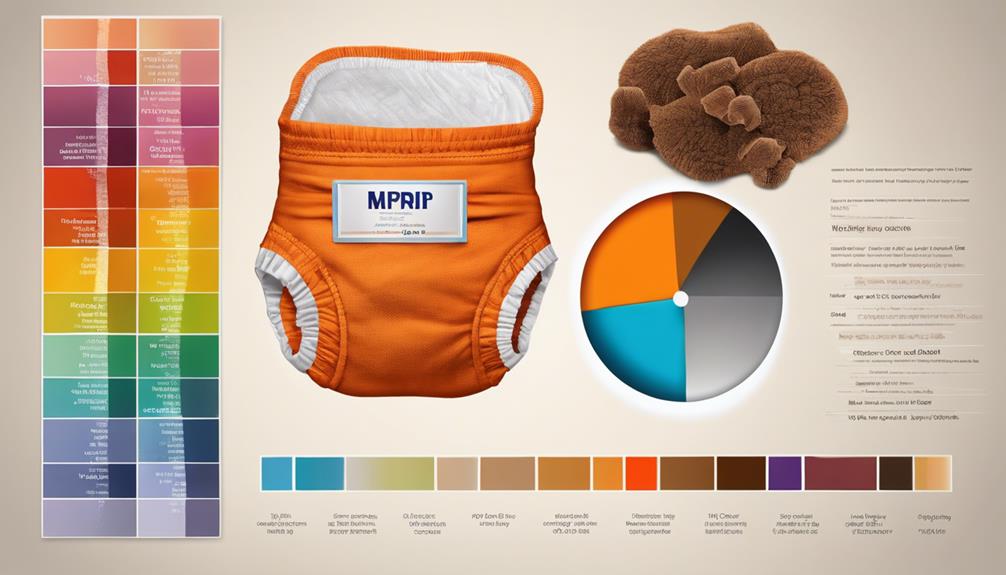When it comes to newborns and their bowel movements, the saying 'patience is a virtue' couldn't be more fitting. Understanding the intricacies of infant constipation requires a delicate approach that balances knowledge and practicality.
But what if there were simple yet effective techniques that could make a world of difference for your little one? Let's explore how this guide can offer important insights and support for caregivers exploring the world of newborn digestion.
Key Takeaways
- Monitor newborn bowel movements based on feeding type.
- Use gentle techniques like tummy massage and leg cycling.
- Look for signs of constipation like hard stools or infrequent BMs.
- Seek medical advice promptly for newborn constipation concerns.
Understanding Newborn Bowel Movements
Have you ever wondered why your newborn's bowel movements seem different from yours? Understanding newborn bowel movements is important for parents to navigate the early days with their little one. Newborns can experience a condition called infant dyschezia, where they push hard due to immature muscles near the anus. This can lead to straining during pooping, which is a normal part of their development as they shift from effortless bowel movements to controlled ones.
For breastfed babies, the frequency of bowel movements can vary, and it's generally considered normal for them to poop after each feeding or even go several days without a bowel movement. True constipation is rare in breastfed infants, but monitoring their bowel movements based on their feeding type is essential. While techniques like rectal stimulation may offer temporary relief, they should be used cautiously as they can disrupt the natural bowel movement process.
Techniques to Help Newborns Poop
To assist newborns in passing stool more comfortably, gentle tummy massage can be a helpful technique. It's crucial to support these little ones as they navigate their bowel movements, especially when constipation becomes a concern. Here are some techniques that can aid newborns in pooping more easily:
- Gentle Tummy Massage: Using circular motions on your baby's abdomen can help stimulate their digestive system.
- Warm Bath: A warm bath can relax the baby's muscles and potentially help with bowel movements.
- Leg Cycling: Gently moving your baby's legs in a cycling motion can aid in relieving constipation.
- Tummy Time: Giving your baby some supervised tummy time can also help with bowel movements by utilizing gravity.
Identifying Signs of Constipation
Identifying signs of constipation in newborns can be important for guaranteeing their comfort and well-being. If your baby is experiencing constipation, you may notice that their stools are hard or pellet-like. This can lead to discomfort during bowel movements, causing your newborn to strain or cry.
Infrequent bowel movements could also be a sign of constipation in newborns. It's critical to pay attention to any blood in your baby's stool, as this may indicate constipation and should be addressed promptly. If you observe these signs in your newborn, consulting with a healthcare provider to determine the best course of action is necessary.
Dietary Adjustments for Newborns

If you've noticed signs of constipation in your newborn, making dietary adjustments can help regulate their bowel movements and alleviate discomfort. When it comes to dietary changes for newborns, different feeding methods can play a significant role:
- Breastfed baby: Breastfed babies tend to have more frequent bowel movements due to the composition of breast milk.
- Formula-fed baby: Formula-fed babies may experience firmer stools compared to breastfed babies.
- Solid foods: Introducing solid foods can impact the frequency and consistency of a newborn's bowel movements.
- Dietary modifications: Any alterations in a newborn's diet can lead to variations in poop color and texture.
Consulting a healthcare provider for guidance on dietary adjustments tailored to your newborn's specific needs is highly recommended. They can provide personalized advice to make sure your baby's digestive system stays healthy and functioning well. Remember, small dietary tweaks can make a big difference in your newborn's comfort and overall well-being.
Seeking Medical Advice for Newborn Constipation
Seeking medical advice for newborn constipation is essential if your baby hasn't had a bowel movement in four days or shows signs of discomfort during stool passage. It's imperative to consult a doctor if you notice your newborn experiencing hard or pellet-like stools, straining, or any discomfort while trying to poop. In such cases, seeking professional guidance is critical to guarantee your baby's well-being.
It's noteworthy that rectal stimulation or unnecessary interventions may not be recommended as they can interfere with the natural bowel movements of newborns. While true constipation is rare in breastfed babies, formula-fed babies may encounter constipation due to various factors.
Regular communication with your pediatrician is key to monitor and address any concerns related to your newborn's bowel movements effectively. Remember, you aren't alone in this journey, and seeking medical advice when needed demonstrates your dedication to your baby's health and comfort.
Frequently Asked Questions
What's the 7 Second Poop Trick?
We gently press on our baby's belly for 7 seconds to stimulate bowel movements. This technique mimics natural movements aiding waste elimination. It's important to apply gentle pressure to avoid discomfort. The 7-second poop trick can help alleviate constipation or discomfort during bowel movements.
Why Is My Newborn Fussy When Trying to Poop?
When our newborns fuss while trying to poop, it's often due to their developing systems adjusting. Their little bodies are learning the ropes, so we support them patiently, offering comfort and keeping an eye on their progress.
What Is the Best Position to Help a Baby Poop?
When a baby needs help pooping, gently lifting their legs towards their chest can assist in relieving gas and moving stool. This natural squatting position mimics their body's mechanics, making bowel movements more comfortable and successful.
How Do I Stimulate My Baby to Poop With Q Tips?
Attempting to stimulate a baby to poop with Q-tips is not advised. It can disrupt natural bowel movements and harm delicate skin. Seek guidance from a healthcare provider for safe and appropriate ways to address your baby's bowel concerns.
Conclusion
As we navigate the twists and turns of our newborn's bowel movements, let's remember to be the gentle guiding hand, steering them towards comfort and relief.
Like a compass pointing north, our understanding and patience will lead us through the challenging terrain of constipation.
Let's remain vigilant, yet calm, knowing that with proper care and attention, we can help our little ones find their way to smooth sailing in the world of pooping.









